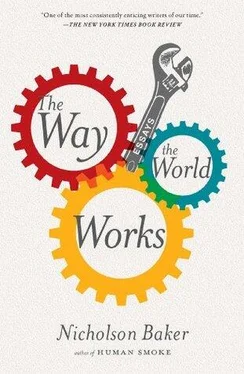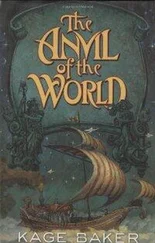Nicholson Baker - The Way the World Works
Здесь есть возможность читать онлайн «Nicholson Baker - The Way the World Works» весь текст электронной книги совершенно бесплатно (целиком полную версию без сокращений). В некоторых случаях можно слушать аудио, скачать через торрент в формате fb2 и присутствует краткое содержание. Год выпуска: 2012, Издательство: Simon & Schuster, Жанр: Публицистика, Критика, на английском языке. Описание произведения, (предисловие) а так же отзывы посетителей доступны на портале библиотеки ЛибКат.
- Название:The Way the World Works
- Автор:
- Издательство:Simon & Schuster
- Жанр:
- Год:2012
- ISBN:нет данных
- Рейтинг книги:4 / 5. Голосов: 1
-
Избранное:Добавить в избранное
- Отзывы:
-
Ваша оценка:
- 80
- 1
- 2
- 3
- 4
- 5
The Way the World Works: краткое содержание, описание и аннотация
Предлагаем к чтению аннотацию, описание, краткое содержание или предисловие (зависит от того, что написал сам автор книги «The Way the World Works»). Если вы не нашли необходимую информацию о книге — напишите в комментариях, мы постараемся отыскать её.
), here assembles his best short pieces from the last fifteen years.
The Way the World Works
OED
Modern Warfare 2
Through all these pieces, many written for
, and
, Baker shines the light of an inexpugnable curiosity.
is a keen-minded, generous-spirited compendium by a modern American master.
The Way the World Works — читать онлайн бесплатно полную книгу (весь текст) целиком
Ниже представлен текст книги, разбитый по страницам. Система сохранения места последней прочитанной страницы, позволяет с удобством читать онлайн бесплатно книгу «The Way the World Works», без необходимости каждый раз заново искать на чём Вы остановились. Поставьте закладку, и сможете в любой момент перейти на страницу, на которой закончили чтение.
Интервал:
Закладка:
A woman held a white cloth with lettering on it: “How Many Lives Will You End? How Many Billions Will You Spend? Before You End This Madness?” Meanwhile someone — I missed his name — began talking about the heavy “F.O.G.,” or Forces of Greed, which surrounded us. “President Obama — with his very lovely smile and lovely family, and beautiful rhetoric — sometimes fools people. Now we know that he’s part of the F.O.G. The F.O.G. needs to be lifted.”
A woman shook my hand and said, “You are so familiar — have we been arrested together?” I said no, I’d never been arrested.
Ralph Nader was up eventually. He began with some words of sympathy for the victims of the disaster in Japan. Then he said, “General Petraeus said there are fifty al-Qaeda, they estimate, in Afghanistan. Why are we blowing that country apart? Why are we sending our injured and sick home day after day?” Iraq, too — we’d blown that country apart. He quoted a coinage from a recent book called Erasing Iraq: “sociocide.”
Someone near me with yellow dyed hair abruptly turned his back on Nader and said “I’m still pissed off at that son-of-a-bitch about Florida.” Everyone else was clapping, though. How was it, Nader asked, that twenty-five or thirty thousand Taliban fighters, with no air force, no navy, no tanks — armed only with Kalishnikovs and suicide belts and rocket-propelled grenades — were able to resist the most powerful military force in history? “Because,” said Nader, “they have a cause that says ‘Expel the invader.’ Expelling the invader will be forever the cause of anybody in the world who is invaded.”
A duct-taped bucket came around for donations to Vets for Peace, and I stuffed in some money. Then Brian Becker of the ANSWER Coalition, a socialist group that sponsored some of the biggest peace demonstrations before the Iraq War, tore into the Libyan intervention, which had begun with the launch of a hundred cruise missiles that morning. “We have to learn the lessons that are so crystal clear, as Obama and the Pentagon and France and Britain prepare in the next few hours to start dropping bombs on the people of Libya in the name of democracy,” Becker said. “Let’s know this: Libya is the largest oil producer in Africa, and there’s no possible way that if the U.S. goes into Libya it’s ever going to come out.” Libya must be the masters of their own destiny, he continued. “We ourselves reject the idea, fed to us once again, that U.S. imperialism, with all of its guns and bombs and missiles, is going to help an oppressed people. The only help we can give to the people of Libya and Egypt and Tunisia and Yemen is to make our own revolution right here!” (Whooping and cheering.)
Watermelon Slim, a craggy country blues singer and Vietnam vet in a camouflage T-shirt, told President Obama to listen up. “Mr. Obama, these wars were George Bush’s wars,” he said. “They are now your wars. I hate to say that, but it’s a fact.” Vietnam vets, Slim said, were now standing at the White House to make known their opposition, just as they’d done back in 1971: “Mr. Obama, you and Mr. Nixon got that in common. We’re paying attention to you. We say, bring our brothers and sisters home, right now!”
Somebody gave me a flyer for the next protest, on April 9 in New York City. Somebody else handed me another flyer, “How Is the War Economy Working for You?” It was published by Veterans for Peace’s Smedley D. Butler Brigade. On it was a quote from Marine Corps General Smedley Butler (1881–1940): “I spent 33 years in the Marines being a high-class muscle man for big business, for Wall Street and the bankers,” Butler wrote. “The general public shoulders the horrible bill in lives, shattered minds, and back-breaking taxes for generations.”
Then Daniel Ellsberg, former Marine Corps company commander and distributor of Vietnam War secrets, was on. He wore a blue blazer and a blue shirt and a sober tie. He was only a few weeks away from his eightieth birthday. He looked great. “Can one person make a difference?” Ellsberg asked. “I would say that without Bradley Manning having released the cables through WikiLeaks that inspired the uprising in Tunisia — along with the self-sacrifice of a Tunisian named Muhammad Bouazizi, who burned himself to death in protest against the oppression there — without either of those individuals, Ben Ali, our dictator there, whom we were supporting, would still be there. And Mubarak would still be in Egypt. So one person can make a difference.”
Ellsberg asked us if we knew the names of the two languages of Afghanistan. Almost nobody in the audience knew. “The two languages are Dari — which is eastern Farsi, or Persian — and Pashto,” he said. “In Vietnam, none of us spoke the language, but we knew the language that we didn’t speak — that it was Vietnamese. We’re fighting in a country now where we don’t know the language we don’t know.”
Kings, Ellsberg said, once locked their critics away in dungeons till they were forgotten; the French, he reminded us, referred to these dungeons as oubliettes. Kings also once declared wars without parliamentary approval. Bradley Manning was now in an oubliette at Quantico for revealing America’s war crimes; and the Libyan intervention was, like Korea, an illegal war, waged without congressional approval. President Obama believed that he was in a throne room in the oval office, said Ellsberg, with a crown on his head. It was up to us to knock that crown off. (Wild cheers, including Indian war-cry ululations.)
Ellsberg said: “One of the groups in Tahrir Square, that had been fighting Mubarak for some time, called itself Kafaya, ‘enough.’ We need an ‘enough’ movement: enough to empire, enough to imperial wars, enough to oubliettes.” And he ended with: “This is a good day to get arrested at the White House, and tomorrow at Quantico.” (Mad applause.)
Mike Ferner took the mic. “If you’re planning on getting arrested, if you have any questions, Matt Daloisio is back here behind the stage. Come on up and see Matt.” Once arrested, you had to pay a hundred dollars to be freed, or else you had to appear later in court, Ferner advised. He introduced Chris Hedges, columnist for Truthdig, who said, “If you want to stop terrorism, you must first stop committing acts of terror.” Ferner then gave us guidance on the march. “This is going to be a silent march,” he said. “We need to keep in mind what we’re here for, which is to observe the eighth anniversary of the invasion of Iraq. We’re here for a solemn purpose. So let’s be that way, purposeful and thoughtful in our march.” He thanked us for coming and then he said, “I’d like to add one personal note to this, which has really been rubbing me raw for some time now.” The people in Afghanistan and Iraq were bearing the brunt of the military aggression, Ferner said, while our cities, our veterans, and our public institutions were all collateral damage. “Our infrastructure and our public institutions may not be being bombed, but they’re being allowed to slowly rot. And that has got to stop.”
The last speaker was Ryan Endicott, an Iraq marine veteran. He was full of powerful indignation, and he spoke at the top of his lungs. “When we joined the military, we rose our right hand, and we swore to defend the people of this country against all enemies foreign and domestic,” he said. “And the biggest enemies to the people of this country do not live in the sands of Iraq. They do not live in the caves of Afghanistan.” He gestured toward the White House. “They live hundreds of yards away!” (Roar of agreement.)
Endicott said: “We know the realities of these brutal occupations, and we know that these people are not our enemies. The fact is that these wars have cost the American people more than just our lives and our limbs.” The wars had cost trillions of dollars, he cried — trillions that could have gone toward free education and health care, that could have prevented millions from losing their homes, and that could have helped thousands of homeless veterans get off the streets. “And that’s why we’re here today in the streets! The streets that we built! With our sweat, and our tears, and our blood!”
Читать дальшеИнтервал:
Закладка:
Похожие книги на «The Way the World Works»
Представляем Вашему вниманию похожие книги на «The Way the World Works» списком для выбора. Мы отобрали схожую по названию и смыслу литературу в надежде предоставить читателям больше вариантов отыскать новые, интересные, ещё непрочитанные произведения.
Обсуждение, отзывы о книге «The Way the World Works» и просто собственные мнения читателей. Оставьте ваши комментарии, напишите, что Вы думаете о произведении, его смысле или главных героях. Укажите что конкретно понравилось, а что нет, и почему Вы так считаете.












